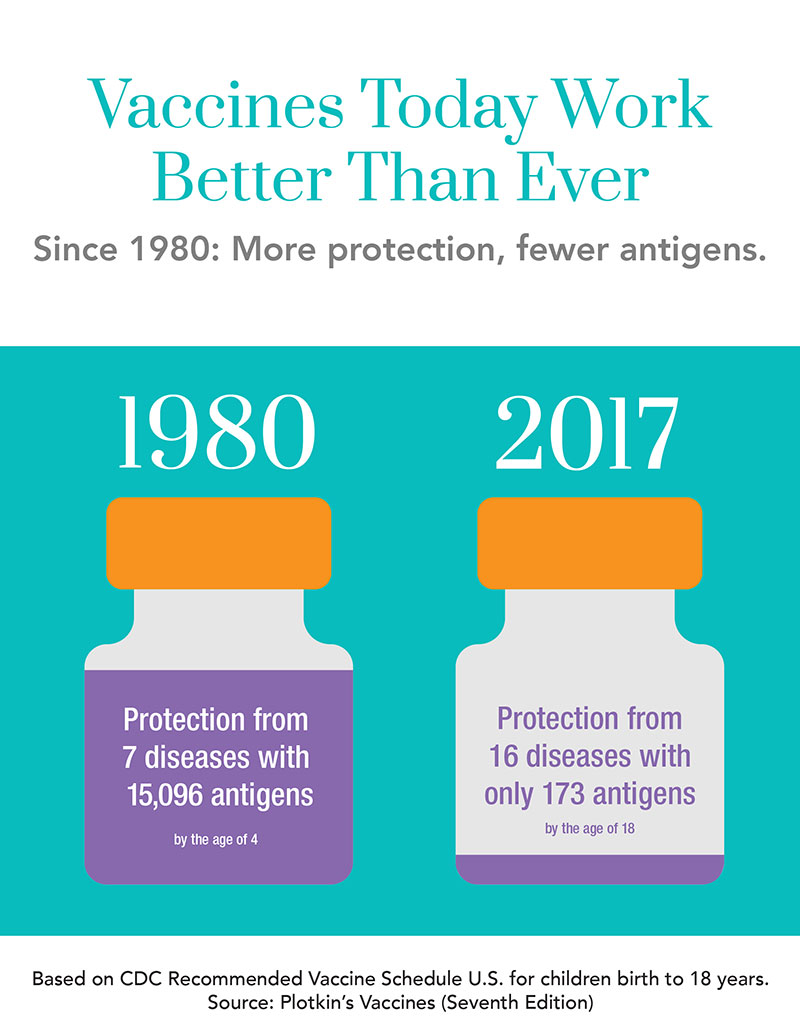Young children—even newborns—begin vaccinations early in life to protect them from serious and deadly diseases that can infect them at a very young age. The effects of these diseases can be very serious, and even life-threatening, for infants and young children who are not protected by vaccination.
A child receives a vaccine based on decades of medical science that shows when the infant is likely to be most susceptible to the diseases and also when the infant will produce the best immune response to a vaccine.
An infant’s immune system is not fully developed until he or she is about six months old. Their immune systems are more vulnerable to infections and diseases than adults. Babies do receive antibodies from their mothers, and the antibodies are shared through the placenta during the last 1-2 months of pregnancy. As a result, newborn babies are immune to some diseases, but this immunity lasts only a few months. Also, most babies do not get protective antibodies against diphtheria, whooping cough, polio, tetanus, hepatitis B, or Hib from their mothers. This is why it’s so important to vaccinate babies before they are exposed to a disease. Through vaccination, infants will start to produce antibodies with each vaccine dose. Most vaccine series are started when babies reach two months old because this is when the high level of antibodies passed on by the mother begins to decline. With the decline in protection, it’s important to start the vaccine series to ensure babies are protected from disease.
Before 1985, the recommended immunization schedule included only seven vaccines and covered only seven diseases. The good news is that today, vaccines can protect children and teens from 16 potentially serious diseases.
Every day, a healthy child’s immune system successfully fights off thousands of antigens—the parts of germs that cause the body’s immune system to go to work. Vaccines contain only a tiny fraction of the antigens that children encounter every day in their environment, even if they receive several vaccines on one day.
- Kids are exposed to 2,000 to 6,000 antigens every day.
- A strep throat infection, for example, exposes children to at least 25 to 50 antigens. That’s comparable to the antigens in the vaccines that infants get at their two-month visit–the DTaP, IPV, HepB, Hib, and rotavirus vaccines combine to just 54 antigens.
And even though children receive more vaccines to protect against more diseases now compared to 30 years ago, the actual number of antigens in vaccines is dramatically less than decades ago because vaccine technology has improved, making vaccines more efficient.
- In 1980, the recommended vaccines contained more than 15,096 antigens.
- Today’s vaccines contain only 173 antigens in 12 vaccines that protect children and teens against 16 vaccine-preventable diseases.

Source: Plotkin’s VACCINES, 7th Edition
Sources:
CDC: The Childhood Immunization Schedule
Children’s Hospital of Philadelphia: Vaccine History
American Academy of Pediatrics: Do Multiple Vaccines Overwhelm or Weaken the Infant’s Immune System?
Verywell: Antigen Counts in Vaccines
